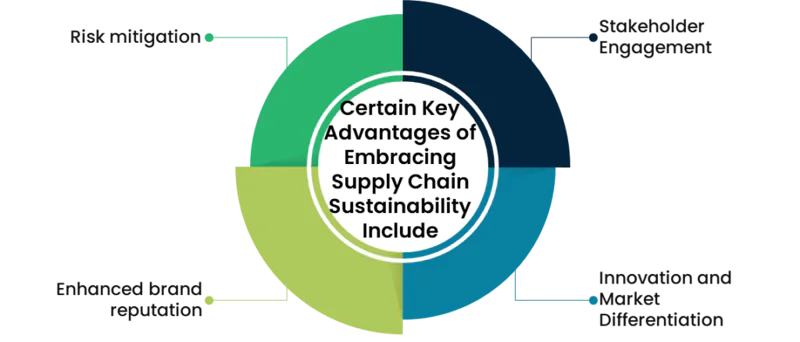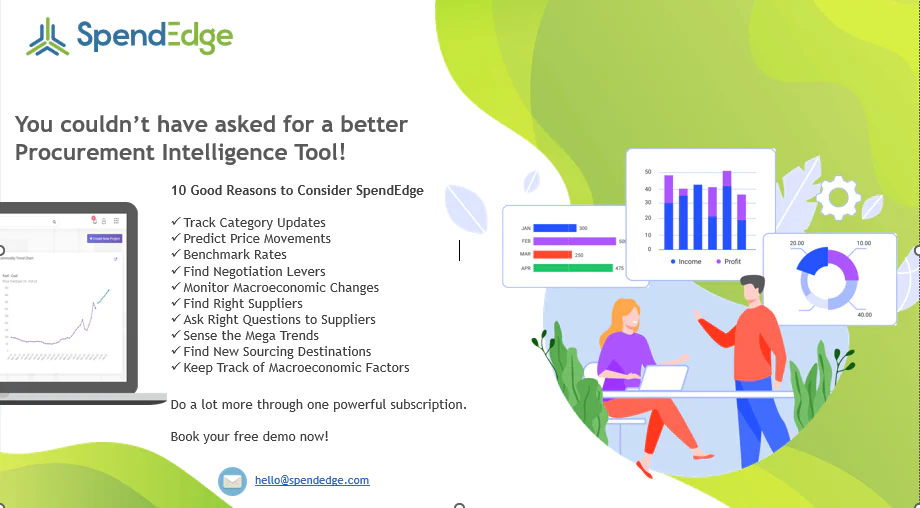By: Manpreet Kaur
In recent years, supply chain sustainability has emerged as a critical concern for businesses worldwide. The interconnected global marketplace has underscored the importance of responsible practices that not only ensure profitability but also prioritize environmental protection, social equity, and long-term viability. As the world faces unprecedented challenges like climate change, resource scarcity, and social injustice, the imperative to build sustainable supply chains has never been clearer.
Understanding Supply Chain Sustainability
Supply chain sustainability refers to the integration of environmentally and socially responsible practices across the entire supply chain, from sourcing raw materials to delivering the final product to consumers. It encompasses efforts to minimize environmental impact, promote ethical labor practices, and foster community engagement while maintaining economic viability.
Why Is Supply Chain Sustainability Important?
One ought to recognise the significance of sustainability in the supply chain, often known as a sustainable supply network or sustainable logistics network. For companies with emerging ESG plans, the supply chain is a common place to start. Perhaps this is to be expected given how compelling the arguments for sustainable supply chains can be. Beyond the apparent benefits of a more ethical supply chain in terms of the environment, society, or governance, these opportunities have the ability to actually provide value for your company, your suppliers, and your clients. Given that many organisations find it difficult to operationalize their ESG commitments, the supply chain can be a great place to start because it offers observable advantages and can encourage action elsewhere in the company.
Challenges and Opportunities
Creating sustainable supply chains is not without challenges. Businesses often face pressure to balance sustainability goals with cost considerations and operational efficiency. Additionally, complexities arise from navigating diverse regulatory frameworks, addressing supplier transparency issues, and managing risks associated with climate change and geopolitical instability.
However, amidst these challenges lie significant opportunities. Sustainable supply chains can enhance brand reputation, foster innovation, and mitigate risks associated with environmental and social disruptions. Moreover, they can create shared value by generating positive outcomes for businesses, society, and the environment.
Certain Key Advantages of Embracing Supply Chain Sustainability Include

Risk Mitigation:
Incorporating sustainability into the supply chain can help mitigate various risks, including regulatory compliance issues, supply chain disruptions, and reputational damage. For instance, companies that rely on non-renewable resources or engage in unsustainable practices may face regulatory penalties or supply chain disruptions due to resource scarcity or environmental disasters. By diversifying suppliers, enhancing transparency, and ensuring ethical sourcing, businesses can build resilience and adaptability into their supply chain operations.
Enhanced Brand Reputation:
Consumers today are increasingly conscious of environmental and social issues, and they prefer to support brands that align with their values. Supply chain sustainability initiatives demonstrate a company’s commitment to environmental stewardship, social responsibility, and ethical business practices, which can enhance brand reputation and customer loyalty. Positive brand perception can translate into increased sales, market share, and competitive advantage in the long run.
Stakeholder Engagement:
Sustainability initiatives can also foster stronger relationships with stakeholders, including customers, investors, employees, and communities. By engaging stakeholders in sustainability efforts, companies can gain valuable insights, build trust, and foster collaboration towards common goals. Moreover, transparent reporting on sustainability performance can enhance accountability and credibility, leading to stronger partnerships and stakeholder support.
Innovation and Market Differentiation:
Embracing sustainability can drive innovation and spur the development of new products, services, and business models. Companies that prioritize sustainability are more likely to identify opportunities for efficiency improvements, waste reduction, and value creation throughout the supply chain. Additionally, by differentiating themselves as sustainability leaders in the market, businesses can attract environmentally conscious consumers, investors, and talent, thereby gaining a competitive edge.
Request a proposal of our services at SpendEdge to see how we can help you implement supply chain sustainability
How should businesses approach: A multi-step process
- Create the business rationale. You can gain support for the project by explaining to your fellow directors the significance of supply chain sustainability.
- Decide what your goals are. Your sustainability plan should have specific, quantifiable objectives and be tightly linked to your company’s mission and vision.
- Specify what you want. Maintaining control over everyone’s expectations is essential if you want your goals to be reachable and practical.
- Establish the project’s scope. Since the biggest risks are frequently found farther down the chain, any attempts to improve supply chain sustainability must go beyond your top suppliers.
- Analyse the performance of your present suppliers and decide how you want to keep an eye on sustainability across your whole supply chain.
- Implement continuous risk management, monitoring and remediation activities ensuring suppliers meet sustainability KPIs.
Conclusion
In conclusion, supply chain sustainability offers a wide range of benefits that extend beyond environmental stewardship to encompass cost savings, risk mitigation, brand reputation, stakeholder engagement, and innovation. By integrating sustainability into their supply chain strategies, businesses can create value, drive positive impact, and position themselves for long-term success in an increasingly complex and interconnected global marketplace. As sustainability continues to gain momentum, it is essential for companies to prioritize responsible and ethical practices throughout their supply chain operations.

Get a free trial of our professional services and see how it helps your business
Author’s Details
Manpreet Kaur
Assistant Manager Presales – Sourcing and Procurement Intelligence
Manpreet is a presales specialist at Infiniti Research and has expertise in sales, business strategy execution, and innovative solution design. She is actively involved in supporting clients from F&B, CPG, Healthcare, Pharma, Chemicals, BFSI, Oil & Gas and Automotive sectors.




